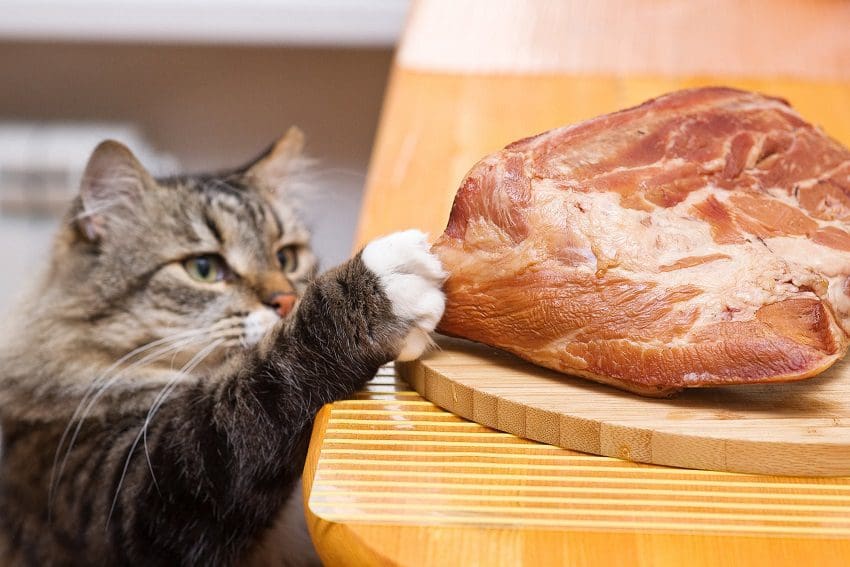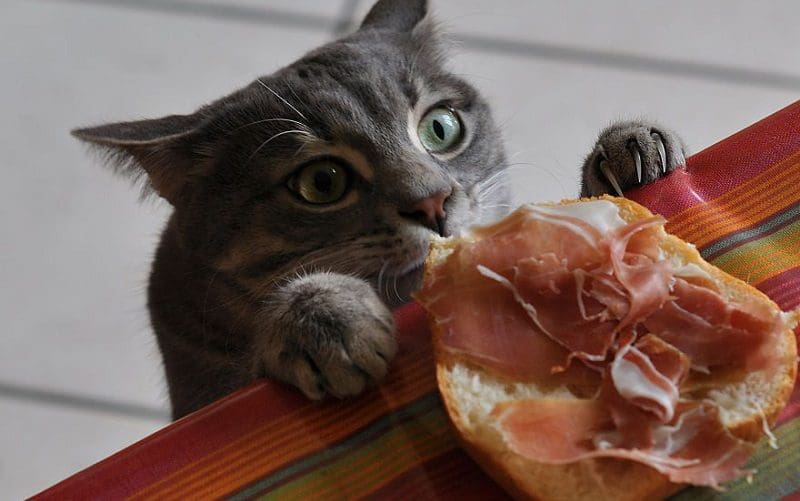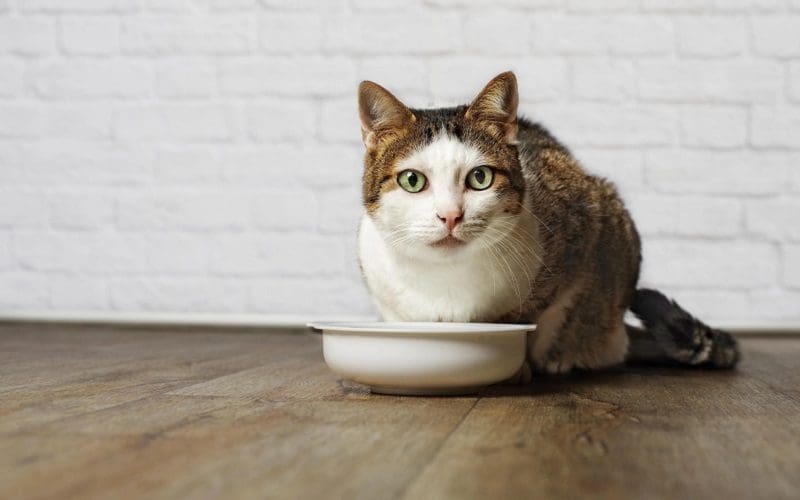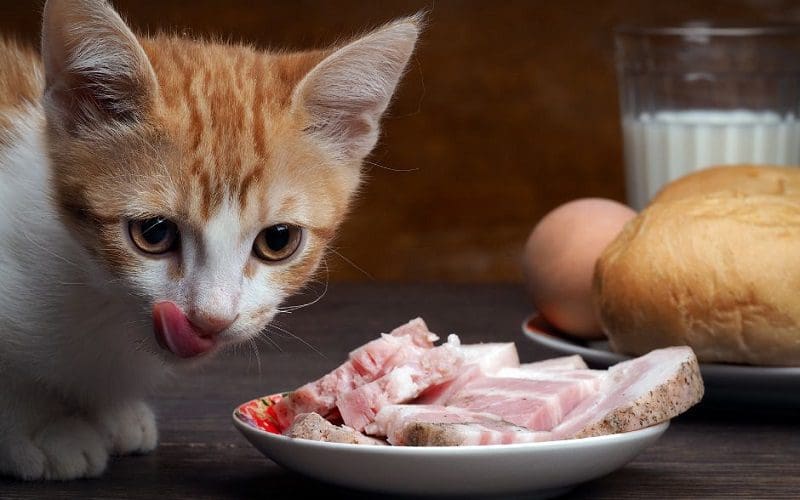Last Updated: 2 years ago
Cat owners are curious about the question: Can cats eat ham? The answer is like solving a cat mystery—yes, but with caution.
On the one hand, ham is meat, and the cat’s diet consists of meat. On the other hand, it is essential to approach this delicacy wisely and for its features.
We will tell you whether ham is good for cats or vice versa, as well as the nuances of feeding. So, let’s dive into the world of cat culinary intrigue. You’ll learn the secrets of ham and your perfect companions.
Do cats like ham?

Cats are curious whisker explorers. And they often raise a paw with interest at the smell of ham.
Some cats’ love of ham can be attributed to the savory aroma that intrigues them. They twitch their noses as if to say, “What’s that deliciousness?”.
However, cats’ taste buds have their peculiarities. Some cats enjoy ham, while others treat it indifferently as just another dish in the kitchen.
It’s like a taste test: some purr with approval, while others maintain a dignified indifference. Have you decided to share a ham appetizer with your furry companion?
Then, observe their reaction. The feline verdict on ham? It varies, just like their unique personalities and preferences.
Is ham bad for cats? Can Cats Eat Ham?

Cats can eat ham in small, cooked, and plain portions as an occasional treat, but it should not be a regular part of their diet.
Cats are finicky eaters. They often like surprises at mealtime. But when it comes to ham, you should exercise caution.
Of course, most cats eat ham. It is entirely unsurprising since ham is the same meat. A small amount of ham now and then won’t hurt your feline friend.
But too much can create specific problems. The thing is that ham contains a lot of salt and fat. Accordingly, it negatively affects the small stomachs of cats.
Consequently, you can get an upset stomach or pancreatitis in a cat. In addition, ham is also often added to other additives.
The most popular are garlic and onions. However, they are bad for cats. Such additives are toxic and lead to serious health problems.
It is worth giving ham on rare occasions to keep your mustachioed companion happy and healthy. Don’t react negatively if your friend asks if cats can eat ham.
Just make sure there are no harmful additives in the ham. And, of course, remember that moderation is key.
It’s vital that your cod enjoy the taste of ham without repercussions. To maintain your cat’s health, always see your veterinarian before adding new items to their diet.
Health Benefits of Ham for Cats

Let’s look at the potential benefits of ham being good for cats.
But, remember, moderation is key. But a small amount of lean ham without seasoning can add variety to their diet:
- Protein boost: Protein is essential for building muscle. Ham is a savory source of it. However, it’s important to remember that excessive ham consumption can lead to an upset stomach and unwanted calories.
- Vitamins: Ham also contains vitamins such as B12. They support the overall health of the body.
- Flavor variety: Ham tastes different from dry food or meat. Accordingly, it can add some variety to a cat’s diet.
Nevertheless, ham is not bad for cats, but it is not a universal product for cat food either. Cats need a balanced diet; ham alone will not do the trick.
Remember that too much salt or seasoning is a feline misdemeanor. Therefore, choose simple, cooked ham. In a word, ham can give the dishes a zest.
But if it is a side dish rather than the main course, your cat’s diet will be as perfect as it is. Always consult your veterinarian to customize the diet to your cat’s unique needs.
How Much Ham Is OK for Cats?

If you want to share ham with your feline friend, it’s best to make do with a small amount.
A small, random slice of lean ham can be a savory treat that doesn’t cause your whiskers anxiety.
However, too much ham can lead to an upset stomach. Additionally, the code can gain extra pounds that will be hard to eliminate.
If a cat eats ham in rare cases, it won’t hurt. But, in other cases, it can lead to health problems. Portions should be small; watch for added seasonings, and consult your veterinarian.
It is important to adjust your cat’s diet properly. Remember, it’s not about size. It’s about the joy it brings without compromising health.
What About Ham Bones?
The talk about cats and the love of ham is endless. But ham bones are a little more complicated. There’s a strict prohibition.
Cats love to chew, but these bones can cause problems. They pose a choking hazard or can cause internal damage.
Bones can also splinter into sharp fragments, damaging the digestive tract. In addition, cooked bones splinter more easily than raw bones.
Be sure to stick to safe cat treats and toys. You’ll be able to satisfy their chewing instincts without harm.
How Should I Feed Ham to Cats?

Let’s understand in detail how cats can eat ham properly:
- Tiny pieces: Cut the ham into small pieces. Cats may find large pieces heavy.
- Moderation matters: Limit portions to occasional treats. Too much ham can lead to health and weight problems.
- No additives: Avoid seasoned or salted ham. Plain, simple ham is the way to go.
Remember that a small portion of ham can spice up dishes. But the thoughtful serving keeps harmony in your cat’s routine.
Conclusion
To summarize, a cat can eat ham. However, it is important to keep a balance. This is a key component that will help ensure a happy and healthy life for your cat.
You can serve small pieces of ham from time to time. This way, you will add something extra and interesting to your cat’s diet.
But the most important thing is that the main part of the diet should be a proper and healthy diet. You can consult a veterinarian to make sure that the cat’s diet is correct.
What’s your experience? Is your cat eating ham or avoiding it? Please share in the comments below.
Resources:
